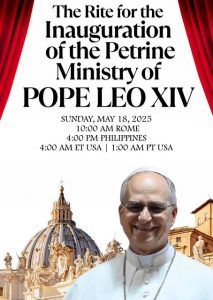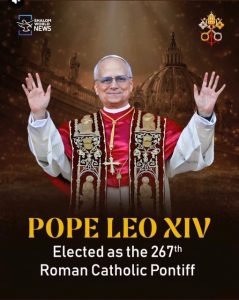Today is the 6th Sunday of Easter. We have just finished the Clergy Retreat at Christ the King Retreat Center. It was our annual renewal, prayer and reflection together, to be recharged from busy schedules and ministry. It was well spent time with God in contemplation necessary to rediscover that we cannot do anything without our profound connection with God. It brings us new strength and vigor to laboriously commit ourselves to this given mandate to evangelize.
In our readings today, we hear of the struggles of the early Church and their determination to focus on God. It also revealed the glorious vision of the new Jerusalem which prepares its people to a new presence of the Lord.
In the first reading from the Acts, the Jews who converted to follow Jesus were confronted by an issue as to whether they still need to fulfill Jewish religious tradition of receiving circumcision for every male as a sign of their dedicated promise to Abrahamic covenant. Their intention was to belong to this growing Church as moved by Jesus and the preaching of His apostles. There was no agreement to this problem except to send Judas and Silas to convey that, “It is the decision of the Holy Spirit and of us not to place on you any burden beyond these necessities, namely, abstain from meat, sacrifice to idols, etc”. We hear the decision in the form of a letter which is sent to Antioch to address the issue.
Since they were believers, the emphasis of the guidance of the apostles is that their baptism speaks about the “circumcision of the heart” which is required into the Way of Jesus. The heart is the symbol of a loving spirit, a life that avoids all forms of impurities and idolatry.
The 2nd reading from the book of Revelation continues to speak St. John’s vision that Jesus is the splendor and the light that illuminates the new Jerusalem because of Christ being the Lamb, present in the whole city to welcome all people. The Church welcomes gentiles, those outside the tribe of Israel. The community that follows Christ becomes a place where God dwells. Thus, it connects to our gospel that Jesus makes it a personal relationship with His people that when everyone dwells by loving God and others, God makes the dwelling with us.
The gospel taken from St. John reminds us that our faith in the Lord Jesus is not an emotional sensation but from our human experience. There are essential points that we need to ponder on:
First, Jesus says, “Whoever loves me will keep my word, and my Father will love him.” Jesus outlines what it means to love him. Those who love Christ want to be close to Jesus, so they follow him, listen to his Words, and remember what He taught them. When we are loved by Jesus, it is both accepting that love, unearned by us, though we must live being so loved. If we keep Jesus’ word, we will then be available for the reception of that ever-offered grace, and we will be available for God’s coming close and making a home in us.
Second, Jesus says, “I have told you this while I am with you. The advocate, the Holy Spirit whom the Father will send in my name, will teach you everything and remind you of all that I told you.” The Holy Spirit continues to be the new Teacher and works in their memory. The Holy Spirit was working in the early Church and even now helps in our discernment as we walk closer with God.
Third, Jesus says, “Peace I leave with you, my peace I give you.” Peace is the foremost gift of Jesus to us. Peace is not exactly satisfaction as the world offers and gives. The peace which Jesus offers frees us from the necessity of self-satisfaction. His Holiness Pope Leo XIV says, “Peace engages and challenges us, to eliminate pride and vindictiveness. It requires religious freedom.” We need to accept each other and enjoy communion with one another.
God loves us in Christ, but this love does not protect us from experiencing worries and fears. That love does not protect us from breaking of hearts, nor losing our way, but His love encourages us to keep His commandments and a promise was made to send the Holy Spirit to abide with us forever.
God bless you.
Fr. Arlon, osa
El Dictado del Corazón
Sexto Domingo de Pascua, Año C
- Lecturas: Hechos 15, 1-2. 22-29
- Salmo 67, 2-3. 5. 6. 8
- Apocalipsis 21, 10-14. 22-23
- Juan 14, 23-29
Hoy es el Sexto Domingo de Pascua. Acabamos de concluir nuestro Retiro del Clero en el Centro de Retiros Cristo Rey, un momento anual de renovación, oración y reflexión. Fue un tiempo para recargar energías después de las exigencias del ministerio y nuestras agendas ocupadas. Este tiempo sagrado de contemplación con Dios es esencial; nos recuerda que no podemos hacer nada sin una profunda conexión con Él. Estos momentos de encuentro nos dan nueva fuerza y vigor para renovarnos en la misión de evangelización.
En las lecturas de hoy escuchamos sobre las dificultades de la Iglesia primitiva y su determinación de mantenerse centrados en Dios. También se nos presenta la visión gloriosa de la nueva Jerusalén, que prepara al pueblo de Dios para la presencia permanente del Señor.
En la primera lectura del libro de los Hechos, los judíos convertidos al cristianismo enfrentaban una pregunta: ¿Debían seguir practicando la circuncisión como signo de la alianza con Abraham? Deseaban pertenecer plenamente a esta Iglesia creciente, movidos por el mensaje de Jesús y la predicación de sus apóstoles. Para resolver la cuestión, los apóstoles y los ancianos enviaron a Judas y Silas con una carta que decía: “El Espíritu Santo y nosotros hemos decidido no imponerles más cargas que los indispensables”. El mensaje fue enviado a Antioquía para afirmar que la salvación en Cristo no dependía del cumplimiento de las antiguas leyes o rituales.
Aquí se destaca que el bautismo representa la “circuncisión del corazón”, es decir, una transformación espiritual. El corazón se convierte en símbolo de un espíritu amoroso y obediente, que rechaza la impureza y la idolatría.
En la segunda lectura, del libro del Apocalipsis, San Juan comparte una visión en la que Cristo, el Cordero, es la luz de la nueva Jerusalén. Ya no es una ciudad exclusiva para Israel; da la bienvenida a todos los pueblos. La Iglesia se convierte en la morada de Dios. Esta visión se conecta bellamente con el Evangelio de hoy: cuando amamos a Dios y a los demás, Dios habita en nosotros.
En el Evangelio según san Juan, Jesús nos recuerda que nuestra fe no es simplemente una emoción pasajera, sino algo que debe estar arraigado en nuestra vida diaria. Hay tres enseñanzas clave que debemos reflexionar:
Primero, Jesús dice: “El que me ama, cumplirá mi palabra y mi Padre lo amará.”
Amar a Jesús significa permanecer cerca de Él: escuchar su palabra, recordar sus enseñanzas y vivirlas. Cuando amamos a Cristo, nos abrimos a recibir su amor, un amor que se nos da gratuitamente, sin que lo merezcamos. Guardar su palabra nos prepara para recibir ese amor y permite que Dios haga morada en nosotros.
Segundo, Jesús nos dice: “el Consolador, el Espíritu Santo que mi Padre les enviará en mi nombre, les enseñará todas las cosas y les recordará todo cuanto yo les he dicho.”
El Espíritu Santo es el Maestro divino que nos guía y nos ayuda a recordar las enseñanzas de Cristo. Así como actuó en la Iglesia primitiva, hoy sigue guiando nuestro discernimiento y acercándonos a Dios.
Tercero, Jesús dice: “La paz les dejo, mi paz les doy.”
La paz de Cristo es su mayor regalo, mucho más profunda que cualquier satisfacción que ofrece el mundo. Es una paz que nos libera del orgullo, del egoísmo y del deseo de venganza. Como dijo el Papa León XIII (no XIV): “La paz nos compromete y nos desafía a eliminar el orgullo y el deseo de venganza. Requiere libertad religiosa.”
La verdadera paz se encuentra en aceptarnos unos a otros y vivir en comunión.
Dios nos ama en Cristo, pero ese amor no nos protege de las dificultades de la vida. Seguimos enfrentando preocupaciones, dolores y momentos de confusión. Pero su amor nos fortalece para cumplir sus mandamientos, y nos ha prometido que el Espíritu Santo estará con nosotros para siempre.
Dios los bendiga a todos.
P. Arlon, OSA





